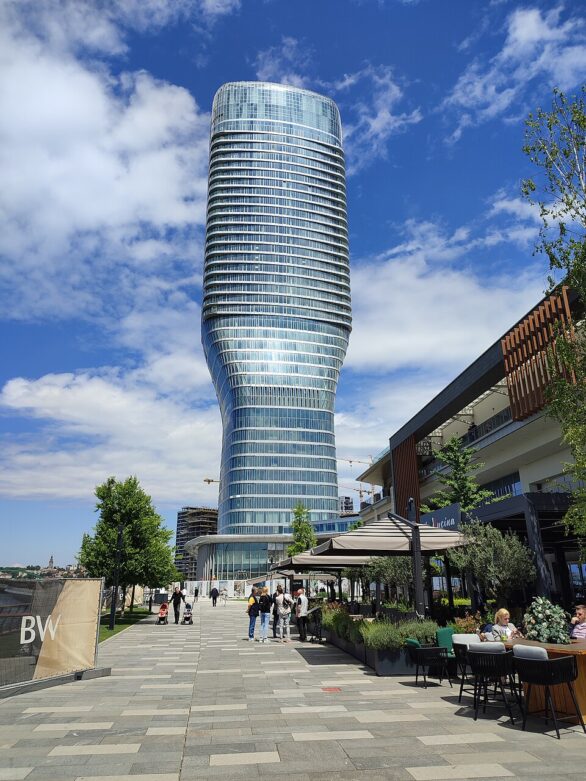Visitors arriving in central Belgrade, the capital of Serbia, are immediately confronted with a striking and somber sight: the war-ravaged ruins of government buildings left in disrepair since the NATO airstrikes of 1999. Among them, the former Defence Ministry buildings stand out—heavily bombed, partially collapsed, and untouched for decades. Like a grin marred by shattered teeth, these structures are more than just debris; they are a physical reminder of Serbia’s recent turbulent history and unresolved wounds.
These buildings, targeted by NATO forces—including the US—as part of efforts to halt Serbia’s military operations in Kosovo, have now become a focal point in a major development controversy. In 2023, the Serbian government struck a deal with an American company, Affinity Global, to transform the symbolic ruins into a $500 million luxury complex featuring a hotel and residential towers.
What raised eyebrows across Serbia and beyond was not only the plan to commercialize such a politically and emotionally charged site but the identity of Affinity Global’s founder: Jared Kushner, son-in-law to former US President Donald Trump. Adding fuel to the debate, the project is slated to include a Trump International Hotel—prompting concerns about foreign influence, historical erasure, and a lack of transparency.
For Serbians, whose collective memory of the NATO bombings remains vivid, the idea of American developers—particularly with direct ties to a former US president—redeveloping a bombed military site is highly provocative. Though Serbian President Aleksandar Vučić defends the decision as a path toward reconciliation and economic progress, critics argue the project may prioritize profit over public interest and national memory.
President Vučić remains adamant: “It’s important to overcome the burden from 1999,” he told the BBC, emphasizing his desire for stronger US-Serbia ties. The president’s position finds partial support among members of Belgrade’s business sector, which sees foreign direct investment as critical to Serbia’s growth. Over the past decade, FDI inflows have more than tripled, though the country’s GDP per capita remains just one-third of the EU average.
Business consultant James Thornley, a long-term resident and former KPMG senior partner, sees the proposed development as a necessary step forward. “That site is an eyesore and should be resolved,” he said. “Nothing’s happened for 26 years—let’s get it sorted out.” For him, the arrival of high-profile investors signals Serbia’s increasing viability as a global investment destination.
However, not all international business figures share his enthusiasm. Andrew Peirson, managing director at regional property firm iO Partners and formerly with CBRE Southeast Europe, voiced concerns about the process. While he acknowledged the potential boost to Serbia’s image and economy, he criticized the opaque nature of the deal. According to Peirson, the government bypassed the standard open tendering procedure, denying other firms the opportunity to compete for the high-value site.
“In most European markets, this would have been done transparently,” Peirson explained. “To ensure you’re getting market value for public land, you typically hold a tender process. It wasn’t done here, and that’s troubling.”
Further complicating matters is the historical and cultural significance of the Defence Ministry site. Designed by prominent architect Nikola Dobrović, the twin buildings lining Nemanjina Street were crafted to resemble a symbolic gateway—mirroring the contours of the Sutjeska Gorge, where Yugoslav partisans defeated Nazi forces in 1943. In 2005, the complex was granted protected status under Serbian cultural heritage law.
Estela Radonjić Živkov, former deputy director of the Republic Institute for the Protection of Monuments, argued forcefully against the redevelopment. “No serious city builds a modern future by demolishing its cultural monuments,” she stated. “Serbia must respect its own laws and heritage.”
Just as the Trump Tower Belgrade project seemed poised to move forward, a major legal twist threw its future into doubt. On May 14, Serbian prosecutors announced the arrest of Goran Vasić, acting director of the Republic Institute for the Protection of Cultural Monuments. Vasić allegedly falsified documents and fabricated an expert opinion that allowed the complex to lose its protected status—thereby clearing the way for redevelopment.
Prosecutors say Vasić has confessed to forging the paperwork, and he now faces charges of abuse of office and document falsification. The revelation has strengthened claims by project opponents that the Trump-Kushner-affiliated development received preferential treatment, though both the Serbian government and Affinity Global deny this.
Affinity Global issued a brief statement distancing itself from the scandal, asserting that Vasić “has no connection to our firm” and promising to “review this matter and determine next steps.” Repeated attempts to obtain more detailed comments from the company were unsuccessful.
In a press conference, Vučić dismissed the forgery allegations as unfounded, stating, “There was not any kind of forgery.” He maintains that the project is moving forward in compliance with Serbian law and that the development represents a fresh start in Serbia-US relations.
The Trump family’s involvement—though apparently limited to branding the hotel—has also come under scrutiny. Jared Kushner met Vučić in 2023 to discuss long-term investment opportunities, while Donald Trump Jr. made subsequent visits to Belgrade. Although Trump critics have accused the former president of exploiting political connections for commercial gain, the Trump Organization and White House representatives have denied any impropriety.
Yet with the project now mired in legal ambiguity, and with opposition growing from cultural preservationists, legal experts, and some business leaders, the future of Trump Tower Belgrade remains uncertain.
For now, the bomb-scarred facade of the Defence Ministry continues to greet visitors to the Serbian capital. With added notoriety from the Trump connection, it serves not only as a reminder of war, but also as a live case study of how history, politics, and profit intersect in the rebuilding of a post-conflict nation.






